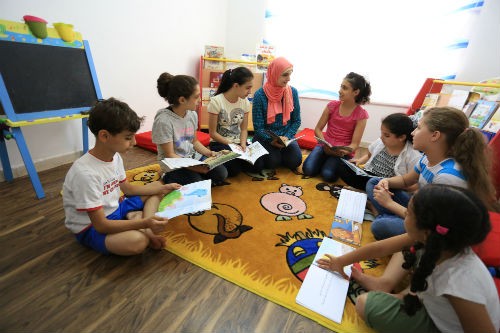
January 2017—Every few seconds, the narrow wooden floor creaks as a group of giggling children flows through the corridors of Carnaval Play & Learn, an after-school and summer program in the city of Zarqa, located to the northeast of the capital city Amman. Each laugh and slam of the door is music to Eman Awamleh’s ears, a mother who founded this one-of-a-kind center in Jordan.
After spending weeks searching, to no avail, for a program that combines fun, constructive and creative learning for her 2-year-old son, Yanal, Awamleh decided to design her own curriculum. “I quickly grew frustrated,” she says. “All the centers were either too expensive or didn’t offer what I was looking for. Plus, all the content that I found online was in English and I knew it just wasn’t the right fit.”
Her friends quickly noticed how effective her curriculum was and started sending their children to her house after school and on weekends. Soon, Awamleh began to freelance, teaching the program as an extracurricular activity in various private schools around Amman before signing annual contracts with them.
Things were moving quickly for Awamleh, but her own community clearly lacked a program like hers, so she knew she had to open her own center in Zarqa. Five years later, with only 20 Jordanian dinars and the ability to launch a Facebook page, Awamleh laid the foundation for what would become Carnaval Play & Learn.
Awamleh had gained enough popularity through social media over the years to apply for a small business grant from USAID’s Local Enterprise Support Project to open up a center that not only benefits youth, but the entire community.
Carnaval officially opened in April 2016 in Zarqa. According to Awamleh, Zarqa is very industrial and underserved when it comes to recreational activities for children of all ages, as day care centers are the only available option for toddlers, leaving older children with no place to go for after-school or summer programs.
Awamleh believes that creative and imaginative play is a natural way for children to learn about the world around them. Her idea was simple: provide a center that teaches children critical and creative thinking and fosters intellectual curiosity through fun activities. It is not unusual to see little kids dressed up as princesses and pirates, while others climb up a small rock wall.
Carnaval is not just a place that offers an exceptional learning opportunity for children—it employs around 20 women and students, allowing them to become active in the economy. It also gives adults the chance to develop skills that can be turned into careers such as drawing, handicrafts and fashion design.
“We encourage stay-at-home mothers to come to the center to take a course,” says Awamleh. “We provide them with all the supplies, and build the schedule around their times of availability with incredibly easy payment terms. And the best part is that their children have a safe place to spend time in while they’re taking their lesson.”
Some parents even make a 30-minute trip daily to drop off their kids at the center. “We try to give children an experience that’s unlike anything they’ve ever seen—something they’ll never learn and experience in school or from television,” adds Awamleh.
Since 2015, USAID’s Local Enterprise Support Project in Jordan has facilitated 83 grants totaling $7.4 million to support the growth of small businesses and improve the long-term economic development of underserved communities. The five-year project began in December 2013.
LINKS
Follow @USAIDJordan, on Facebook, on Flickr, on YouTube







Comment
Make a general inquiry or suggest an improvement.